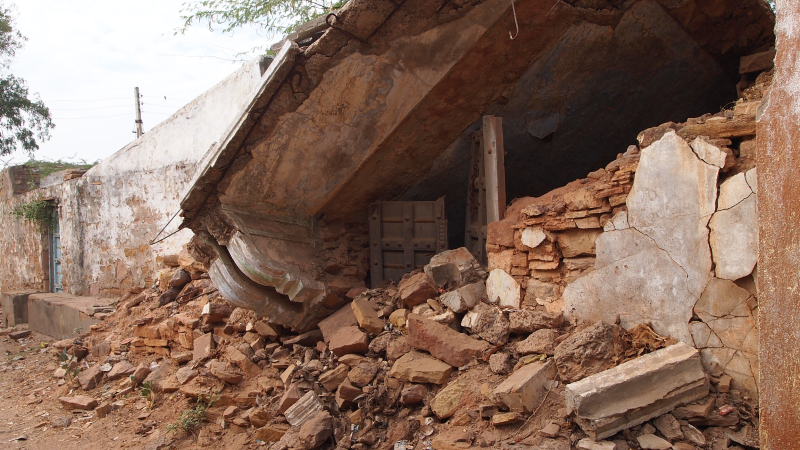Global Development and Humanitarian Practice
MA or PGDip or PGCert
Start dates: September 2026
Full time: MA: 12 months, PGDip: 9 months, PGCert: 3 - 9 months (depending on module choice)
Part time: MA: 24 months, PGDip: 21 months, PGCert: 9 months
Location: Headington
School(s): School of Architecture
Overview
Are you looking for a master’s programme that combines humanitarian practice, human rights, forced migration, development and conflict studies?
Working with our team of experts and practitioners you can study the political complexities that lead to armed conflict or natural hazards and their links to humanitarian practice and human rights responses. We look at which development approaches have increased the impacts of climate change and disasters and explore challenging questions on whether humanitarian practice does more good than harm? If the international human rights system is failing and how we can support refugees in the 21st century?
Our practice-based learning includes the option of work placement with international humanitarian organisations and NGOs, field trips and assessments, such as writing a policy brief that gives you critical employability skills.
Our students go on to work in humanitarian and development international organisations and NGOs.

Why Oxford Brookes University?
-
Learn from experts
Run by the Centre for Development and Emergency Practice, the course is delivered by expert researchers and practitioners and features the latest thinking in the field. Our experienced staff don’t just teach the subject, they help you become a reflective practitioner in your field.
-
Practice focus
Our practice-based focus in teaching and assessments gives you access to people working in the sector and helps strengthen your employability skills. Work placement opportunities and optional field trips abroad offer you first-hand knowledge of the issues you’re studying.
-
Pick your specialism
Within the dissertation, you can choose to specialise in specific areas based on the expertise of our teaching team of researchers and practitioners.
-
Delivered by the School of Architecture
This means we can offer unique perspectives on topics like shelter reconstruction after disasters. Or how design can resolve development and humanitarian problems.
-
Diverse classrooms
You get to experience genuine diversity - work with students from all over the world coming from different academic disciplines, with diverse work and life experiences.
Course details
Study modules
Practice based learning is heavily integrated into all our modules. You will work alongside established academics and renown international practitioners.
We also offer the possibility of taking on short work placements and our students have worked with international and local organisations including: International Federation of Red Cross and Red Crescent Societies (IFRC), CARE International, Minority Rights Group, Architects Sans Frontieres (ACF) and the Oxford based Refugee Resources and Asylum Welcome.
We try to offer annual field trips as part of the programmes and previous student cohorts have been to Colombia, Lebanon and Ethiopia.
The modules listed below are for the master's award. For the PGDip and PGCert awards your module choices may be different. Please contact us for more details.
Please note: As our courses are reviewed regularly as part of our quality assurance framework, the modules you can choose from may vary from those shown here. The structure of the course may also mean some modules are not available to you.
Research
Research specialisations linked to the five research clusters within the School of Architecture offer cutting edge teaching from subject area experts.
The specialisations are:
- disasters and natural hazards
- development
- human rights and transitional justice
- conflict transformation
- humanitarian response
- forced migration
- decoloniality and marginalised groups
Careers
Past students are working at international development organisations like Save the Children or the United Nations. Some have started their own agencies or aid groups. Others are continuing their academic work, with PhDs in subjects like communication during Covid, food security, climate disasters or refugee wellbeing.
The broad scope and practical nature of the course will help you thrive in any development or emergency practice role. You could enhance your current career or look for work in:
- NGOs - international and national,
- human rights, forced migration and development,
- United Nations agencies and organisations,
- governmental and commercial organisations working in development.
Of course, your critical thinking, analysis and design skills will apply to work beyond these areas too.
Related courses
Entry requirements
Specific entry requirements
The programme is open to candidates who fulfil at least one of the following conditions:
- hold a good honours degree (2.2) in a related discipline such as anthropology, sociology, economics, geography, psychology and other social sciences, architecture, Law, public health, public administration. Other fields are also welcomed, for example, medicine, IT, communications, information systems etc.
- hold a relevant recognised diploma or professional qualification (eg in architecture, planning, environmental psychology, public health, public administration)
- are in their final year of studying a degree in any relevant discipline
- have substantial and proven field experience.
Please also see the University's general entry requirements.
English language requirements
If your first language is not English you will require a minimum academic IELTS score of 6.5 overall with 6.0 in all components.
OR
An equivalent English language qualification acceptable to the University.
Please also see the University's standard English language requirements.
Pathways courses for international and EU students
We offer a range of courses to help you meet the entry requirements for your postgraduate course and also familiarise you with university life in the UK.
Take a Pre-Master's course to develop your subject knowledge, study skills and academic language level in preparation for your master's course.
If you need to improve your English language, we offer pre-sessional English language courses to help you meet the English language requirements of your chosen master’s course.
English requirements for visas
If you need a student visa to enter the UK you will need to meet the UK Visas and Immigration minimum language requirements as well as the University's requirements. Find out more about English language requirements.
Terms and conditions of enrolment
When you accept our offer, you agree to the Terms and Conditions of Enrolment. You should therefore read those conditions before accepting the offer.
International qualifications and equivalences
How to apply
Application process
Tuition fees
Questions about fees?
Contact Student Finance on:
Tuition fees
The following factors will be taken into account by the University when it is setting the annual fees: inflationary measures such as the retail price indices, projected increases in University costs, changes in the level of funding received from Government sources, admissions statistics and access considerations including the availability of student support.
How and when to pay
Tuition fee instalments for the semester are due by the Monday of week 1 of each semester. Students are not liable for full fees for that semester if they leave before week 4. If the leaving date is after week 4, full fees for the semester are payable.
- For information on payment methods please see our Make a Payment page.
- For information about refunds please visit our Refund policy page
Additional costs
Please be aware that some courses will involve some additional costs that are not covered by your fees. Specific additional costs for this course are detailed below.
Optional costs
| Additional costs | Amount (£) |
|---|---|
If you choose to participate in any additional, optional trips, you are responsible for any associated costs. |
£10-150 |
It’s your responsibility to cover print / binding costs where coursework submission is required. Please note that a lot of the coursework is now submitted online. |
From £30 |
| You may choose to purchase books to support your studies. Many books on our reading lists are available via the Library, or can be purchased secondhand. | £20-60 per book |
Accommodation fees in Brookes Letting (most do not include bills) |
£107-301 per week |
Accommodation fees in university halls (bills included, excluding laundry costs) |
£139-248 per week |
Graduation costs include tickets, gowning and photography. Gowns are not compulsory but typically students do hire robes, starting at £41. |
Typically £0-200 |
Students are responsible for their own travel to and from university for classes. For the 2025/26 academic year, the University is introducing an alternative subsidised travel offer for all students with further information on our Travel webpages. |
From £10 |
Funding your studies
Financial support and scholarships
Featured funding opportunities available for this course.
All financial support and scholarships
Programme changes:
On rare occasions we may need to make changes to our course programmes after they have been
published on the website. For more information, please visit our
changes to programmes page.

